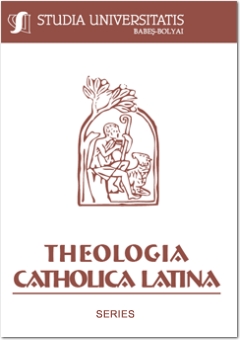IS THERE A GAP BETWEEN THE INTEREST FOR SPIRITUALITY AND THE COMMUNICATION OF CHRISTIAN TRADITIONS TODAY?
IS THERE A GAP BETWEEN THE INTEREST FOR SPIRITUALITY AND THE COMMUNICATION OF CHRISTIAN TRADITIONS TODAY?
Author(s): Gabriella DénesSubject(s): Christian Theology and Religion
Published by: Studia Universitatis Babes-Bolyai
Keywords: churches; religion; spirituality; new religious forms; civil religion; esotery.
Summary/Abstract: 114000 matches are found to the word “spirituality” on Google in Hungarian language, and further more (35 900 000) in English. Many of these websites are speaking about spirituality in the context of esotery or even witchcraft. The theme is also linked with metaphysical expectations, longings of people who are seeking to solve their restlessness about the question of life after death. This problem and this quest is present in the Western world as well as in our own Eastern-European and Transylvanian context. Institutionalized, traditional churches and religiousness is not attractive anymore, but this does not coincide with the rejection of spirituality. On the contrary, there is a huge interest for alternative forms of spirituality. Those who know Christian spirituality in depth find this sad, annoying or surprising, because they are aware of the well-defined form and content of Christian spirituality throughout the ages. They define the problem as a gap between the traditional knowledge and contemporary culture/people. The present research tries to survey this particular gap. In order to reach a reasonable result, we start from the following assumptions: 1. the traditional religion and religiosity has the repository of approaches towards spirituality, and also of forms that are suitable for use/practice; but 2. these had become estranged for people nowadays due to several factors, one of these being the gap between the theological and the intellectual approach and the vernacular religiosity taking into account the psychological needs of the individual and of the religious group. As a conclusion of the research we will also try to present a solution, a possibility that could help the institutional church to communicate its “offer” in a more adequate way for the benefit of spirit and soul. The research is designed in an interdisciplinary frame: we apply the methods and outcome of cultural anthropology, folklore, the study of vernacular religiosity, communication. The research thus refers to the study of sacral and church communication, and thus can formulate the needed answers.
Journal: Studia Universitatis Babes-Bolyai - Theologia Catholica Latina
- Issue Year: 2011
- Issue No: 1
- Page Range: 95-108
- Page Count: 14
- Language: English

